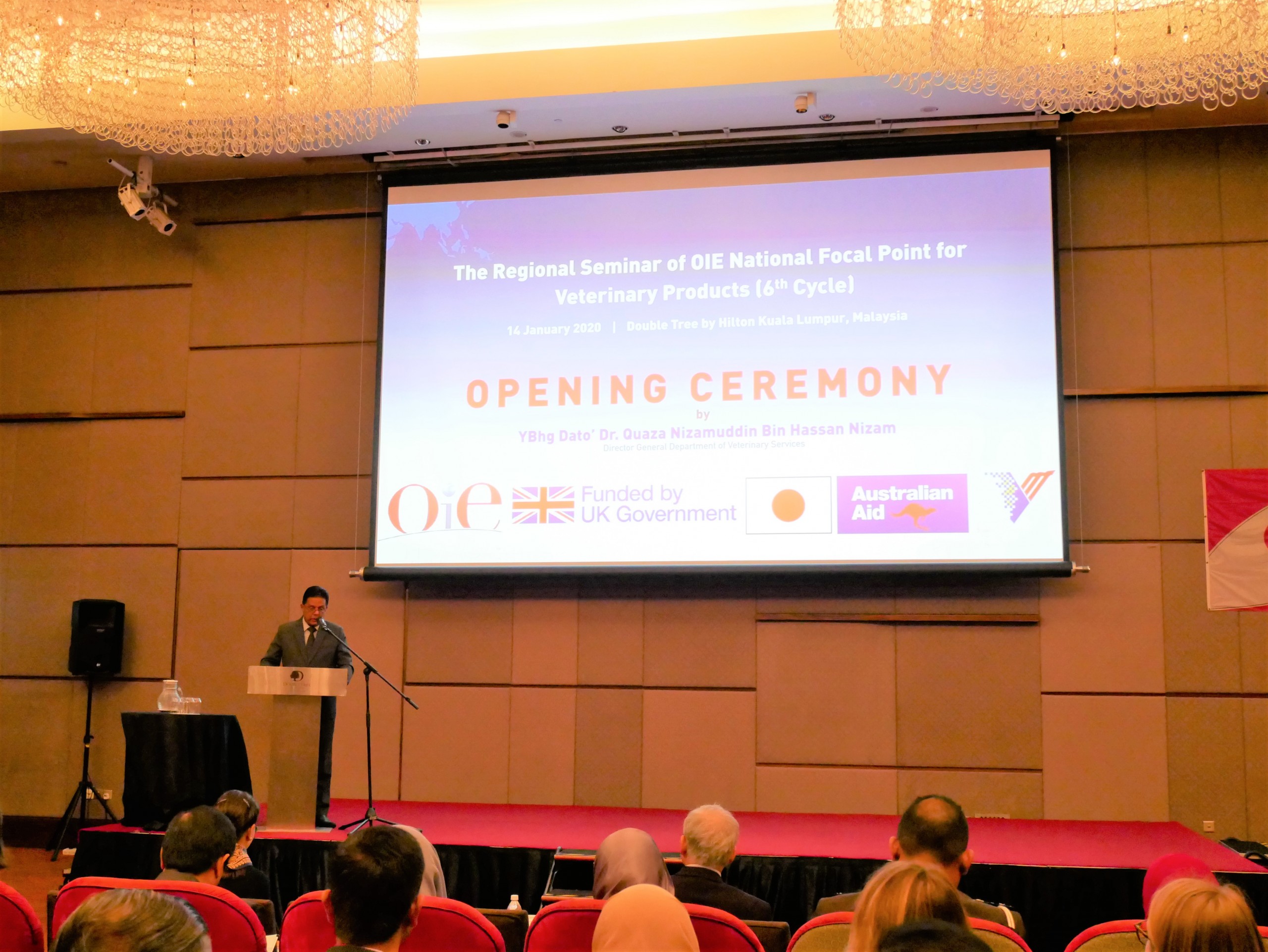During the 76th General Session in May 2008, the importance of the Focal Points (FPs) for information on animal diseases was re-iterated, and Delegates were also requested to nominate additional focal points for wildlife, veterinary products, animal production food safety, animal welfare and aquatic animals. OIE FPs, nominated by OIE Delegates and acting under their supervision, is an important mechanism for countries to satisfy their OIE obligations and to strengthen communication and collaboration between Member Countries (MCs) and the OIE.
The OIE Sub-Regional Representation (SRR) for South East Asia was established in 2010 and has been entrusted with the organisation of several training courses for OIE FPs including wildlife, animal disease notification, animal welfare, communication, aquatic animal diseases and veterinary products.
Under the technical supervision of the OIE Scientific and Technical Department, now renamed the OIE Antimicrobial Resistance and Veterinary Products Department, the training of Focal Points for Veterinary Products in Asia and the Pacific commenced in 2011 with a first (cycle) seminar organised for all Focal Points in Siem Reap, Cambodia : https://rr-asia.woah.org/about-us/focal-points/veterinary-products/ and was followed by second, third, fourth and fifth cycle seminars in Bangkok, Thailand and Tokyo, Japan in 2012-2018
These seminars provided the FPs with knowledge on rights, commitments, and responsibilities of the OIE National Focal Points in the standard-setting process and compliance of their countries with the OIE international standards. It also provided the more in-depth understanding of key issues such as antimicrobial resistance (AMR) including the Global Action Plan developed by WHO with the support of the OIE and FAO, Tripartite activities, the OIE database on the use of antimicrobial agents, and the OIE strategy on AMR, raise awareness on anti-parasitic resistance, and quality of veterinary products including the challenge of falsified medicines, possibility on harmonisation/convergence of regulatory systems for registration of veterinary products.
The new cycle (VI) will build on the feedback received from previous seminars, focus on different aspects of quality of veterinary medicines and revisit the recommendations of the 2nd OIE Global Conference on Antimicrobial Resistance and Prudent Use of Antimicrobial Agents in Animals “Putting Standards into Practice” (Marrakesh, Morocco, 29 – 31 October 2018).
The experts from OIE Collaborating Centres (OIE CCs) will technically support the seminar like previous times.
Meeting Document
Concept note & Agenda
List of participants
How to set up Pharmacovigilance
EN Questionnaire (SF veterinary products)
EN Definitions for working group
EN Case study (pharmacovigilance)
Presentation
Country presentations on recent activities (Rozanah Asmah Abd Samad)
Update on the OIE standards and guidelines relevant to veterinary medicinal products (Mária Szabó)
Aquatic animal vaccines (Nao Nakajima)
EEV Recommendations OIE 2nd Global Conference (Elisabeth Erlacher-Vindel)
Examples of existing guidance on autogenous vaccines (Jean-Pierre Orand)
Views and experience on autogenous vaccines (Suphot Wattanapansak)
VICH General Principles, Global Outreach and the 6th Public Conference (Bettye Walters)
Japan’s Experiences (Ken Noda)
Applying VICH Quality Guidelines (Rick Clayton)
VICH Outreach Forum member countries’ experience (Pramod Kumar Kaushik)
Regulatory Authority perspective on veterinary medicinal products harmonisation in ASEAN (Ni Made Ria Isriyanthi)
Industry perspective on convergence/harmonisation (Erik de Ridder)
Outcomes of the online questionnaire on the quality of veterinary products and pharmacovigilance (Tikiri Wijayathilaka)
Introduction to pharmacovigilance (Linda Walter-Grimm)
Veterinary pharmacovigilance (Dan Edson)
Introducing the Manual for a basic pharmacovigilance system (Erik de Ridder )
Country experience – Monitoring on quality of veterinary medicinal products (post-marketing surveillance) (Wenyuan Yang)
How to ensure the quality of veterinary medicinal products? (Jean-Pierre Orand)
Country experience – Centralised System of Veterinary Medicines Procurement, Distribution, and Monitoring (Hiruka Mahath)
Global surveillance and monitoring of falsified and substandard veterinary medicinal products (Rebecca Hibbard)
WCO and OIE collaboration. Future collaboration with Focal Points in order to fight falsified veterinary products (Saori Nojima)
Country experience – Promoting access to high quality veterinary antimicrobials (Sasi Jaroenpoj)
Introduction to SF working group (Mária Szabó)
Global tripartite and OIE activities on AMR (Elisabeth Erlacher-Vindel)
OIE regional activities on AMR (Hirofumi Kugita)
OIE Antiparasitic resistance (Mária Szabó)
Antiparasitic resistance (Nick Sangster)
Achievements and future perspectives (Rozanah Asmah Abd Samad)

